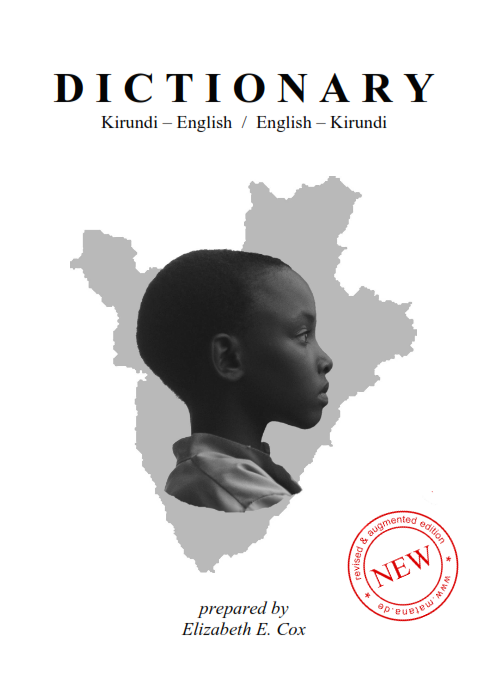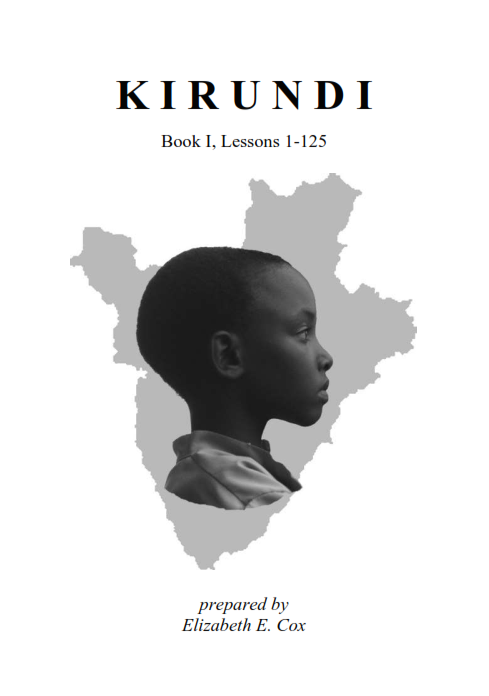leave ▶ (to) guheba, kujījūka, kureka, gusiga, kugēnda, kuvaho, gutāha
(at, for) kurekera, gusigira
(abruptly) kwōnjorora
(behind) gusiga
(country) kwāmbuka, guhaba
(country because of famine) gusuhūka
(grass and stuff growing in kraal) gutongoza
(group and go by oneself) kujōnjōra
(inheritance) kuraga
(intention or place) gucungūra
(open) kurāngāza
(out) guhaza
(over) gusigaza
(place) gushingūka
(something with someone) kubītsa
(with) gusigarana
(at, for) kurekera, gusigira
(abruptly) kwōnjorora
(behind) gusiga
(country) kwāmbuka, guhaba
(country because of famine) gusuhūka
(grass and stuff growing in kraal) gutongoza
(group and go by oneself) kujōnjōra
(inheritance) kuraga
(intention or place) gucungūra
(open) kurāngāza
(out) guhaza
(over) gusigaza
(place) gushingūka
(something with someone) kubītsa
(with) gusigarana
En-En dictionary
place ▶ (to) gushira
(to ~ here and there) gukwīragiza
(in order) gukirānura, kuringaniza, kurorānya
(facing each other) kurorānya
(objects together in irregular fashion, end for end) gucurikiranya
(obliquely) guhirika, gukīkama
(be placed obliquely) gukīka
(on) gushikiriza
(one thing above another) kugereka, kugerekeranya
(oneself) guherēra
(somewhere) gushiraho
(two things side by side, parallel) kubāngikanya
(to be placed wrong end to) gucurama
(to give place to each other) kubisīkanya
(to hold in) kugumya
(to leave a) gushingūka
(to make) kubisa
(to make for one another to pass) kubisīkanya
(to put a thing in its certain ~) gutereka
(to remain in ~ of another) gusigarira
(to stand in a certain ~ thus making ~ for another) kubisiriza
(to take the ~ of another) kwākīra
(to take the ~ of another watching) kubangūra
(to go from ~ to ~) kuyugayuga
(to ~ here and there) gukwīragiza
(in order) gukirānura, kuringaniza, kurorānya
(facing each other) kurorānya
(objects together in irregular fashion, end for end) gucurikiranya
(obliquely) guhirika, gukīkama
(be placed obliquely) gukīka
(on) gushikiriza
(one thing above another) kugereka, kugerekeranya
(oneself) guherēra
(somewhere) gushiraho
(two things side by side, parallel) kubāngikanya
(to be placed wrong end to) gucurama
(to give place to each other) kubisīkanya
(to hold in) kugumya
(to leave a) gushingūka
(to make) kubisa
(to make for one another to pass) kubisīkanya
(to put a thing in its certain ~) gutereka
(to remain in ~ of another) gusigarira
(to stand in a certain ~ thus making ~ for another) kubisiriza
(to take the ~ of another) kwākīra
(to take the ~ of another watching) kubangūra
(to go from ~ to ~) kuyugayuga
En-En dictionary
guhaba (-havye) v ▶ 1. to go far away, 2. to leave the country
persuade ▶ (in underhanded way) kubembeteranya
(to succeed to ~ someone to leave his evil ways) gukōndōra
(to talk with someone to try to ~ her to elope) gucīkiza
(to try to ~) gukiranira
(to succeed to ~ someone to leave his evil ways) gukōndōra
(to talk with someone to try to ~ her to elope) gucīkiza
(to try to ~) gukiranira
En-En dictionary
evil ▶ ikibi, ububi, inābi
(adj.) –bi
(to speak ~ of) gukana, kunegura
(to speak ~ of one another) gucurikanya
(to speak ~ of a ruler) kuyoba
(to seek out ~ doer, witch doctor) kuragura
(to have witch doctor seek out ~ doer) kuraguza
(to sprinkle 'medicine' around house to protect it from ~) kurēmbeka, gutota
(to chase away ~ spirits) gusēnda
(to succeed in persuading someone to leave his ~ ways) gukōndōra
(speaking ~ of another with whom you work) ikēba
(~ deed) ubuhūmbu
(example) akābarore
(~ language, esp. young girl's) ubweruzi
(~ look) igitsūre
(adj.) –bi
(to speak ~ of) gukana, kunegura
(to speak ~ of one another) gucurikanya
(to speak ~ of a ruler) kuyoba
(to seek out ~ doer, witch doctor) kuragura
(to have witch doctor seek out ~ doer) kuraguza
(to sprinkle 'medicine' around house to protect it from ~) kurēmbeka, gutota
(to chase away ~ spirits) gusēnda
(to succeed in persuading someone to leave his ~ ways) gukōndōra
(speaking ~ of another with whom you work) ikēba
(~ deed) ubuhūmbu
(example) akābarore
(~ language, esp. young girl's) ubweruzi
(~ look) igitsūre
En-En dictionary
over ▶ (way over there) harīya
(not too far away) harya
(to be almost, night) gushīra, e.g. ijoro rishīra ubuca
(to be left) gusigara
(to leave) gusigaza
(left-overs) imisigazwa
(not too far away) harya
(to be almost, night) gushīra, e.g. ijoro rishīra ubuca
(to be left) gusigara
(to leave) gusigaza
(left-overs) imisigazwa
En-En dictionary
kuraga (-raze) v ▶ to leave as inheritance
speak ▶ (speaking evil of another with whom you work) ikēba
(one who speaks with senseless repititions of words) ikirogorogo
(all speaking together) imvugarimwe
(to ~) kuvuga
(against) guhāririza
(carelessly) gufudika
(clearly) gufobōra, gutobekeranya
(distinctly) gutobora
(distinctly, not having been able to before) gutumbūra
(evil of one another) gucurikanya
(evil of) gukana, kunegura
(evil of the king) kurogota
(evil of a ruler) kuyoba
(fearlessly) kwūbahuka
(foolishly) kudebagura
(hatefully) gucobogoza
(hesitantlyusually used in negative) guhengēshanya
(in a mysterious language) gufobeka
(incoherently) kuvōvōta
(in someone's favor) gutēturura
(lightly) kujajura
(loudly) kurangurura, kurandamuka
(many words, usually quite meaningless ones) guhogōmboka
(sarcastically) kurtyekeza
(the truth) guhinyuza
(thoughtlessly) kurandamuka
(unwisely or rudely) kurofokwa
(very beseechingly) kubobōteza
(when one shouldn't) kuyogora
(where others hear voices but do not understand) guhwirima
(without arriving at point) kurerembuza
(to cause to) kuvuza
(to leave off speaking evil and speak kindly) kwigarura
(to prevent from speaking) guhwāmika
(give gift to bride so she will ~) guhorōra
(refuse to speak till given gift, as bride does) guhorōrwa
(one who speaks with senseless repititions of words) ikirogorogo
(all speaking together) imvugarimwe
(to ~) kuvuga
(against) guhāririza
(carelessly) gufudika
(clearly) gufobōra, gutobekeranya
(distinctly) gutobora
(distinctly, not having been able to before) gutumbūra
(evil of one another) gucurikanya
(evil of) gukana, kunegura
(evil of the king) kurogota
(evil of a ruler) kuyoba
(fearlessly) kwūbahuka
(foolishly) kudebagura
(hatefully) gucobogoza
(hesitantlyusually used in negative) guhengēshanya
(in a mysterious language) gufobeka
(incoherently) kuvōvōta
(in someone's favor) gutēturura
(lightly) kujajura
(loudly) kurangurura, kurandamuka
(many words, usually quite meaningless ones) guhogōmboka
(sarcastically) kurtyekeza
(the truth) guhinyuza
(thoughtlessly) kurandamuka
(unwisely or rudely) kurofokwa
(very beseechingly) kubobōteza
(when one shouldn't) kuyogora
(where others hear voices but do not understand) guhwirima
(without arriving at point) kurerembuza
(to cause to) kuvuza
(to leave off speaking evil and speak kindly) kwigarura
(to prevent from speaking) guhwāmika
(give gift to bride so she will ~) guhorōra
(refuse to speak till given gift, as bride does) guhorōrwa
En-En dictionary
gutāha (-tāshe) v ▶ to go home, to leave
uk'umwaka utashe at the end of every year
uk'umwaka utashe at the end of every year
inheritance ▶ umwāndu, uburage, umurage, iragi
(inherited property) ishāmvu
(inherited property or position) akārōnda
(to leave ~) kuraga
(inherited property) ishāmvu
(inherited property or position) akārōnda
(to leave ~) kuraga
En-En dictionary
famine ▶ ikigoyi, amapfa, ikiza, inzara
(to leave one's country because of) gusuhūka
(to return after) gusuhūruka
(to leave one's country because of) gusuhūka
(to return after) gusuhūruka
En-En dictionary
guhaza (-hajije) v ▶ 1. to leave out, omit, 2. lack, 3. to tan hides
gusigaza (-sigaje) v ▶ to leave over, to leave a part of something, to cause to be left
kujoreza (-joreje) v ▶ to astound, leave one speechless
kurekera (-rekeye) v ▶ to leave at, for
kuvīra (-vīriye) v ▶ 1. to flow out, 2. to be spilled, 3. to shed, to pour, 4. to leave from
succeed ▶ (to) gutsīnda, gushobora
(in persuading someone to leave his evil ways) gukōndōra
(in persuading someone to leave his evil ways) gukōndōra
En-En dictionary
gusigana (-siganye) v ▶ to leave each other
kurāngāza (-rāngāje) v ▶ to leave open
kwāmbuka (-āmbutse) v ▶ 1. to cross (road, river), 2. to travel, 3. go far away, 4. to leave the country
kwīgarura (-īgaruye) v ▶ 1. to leave off speaking evil and speak kindly, 2. be converted
gusigariza (-sigarije) v ▶ to leave for
gusigarana (-sigaranye) v ▶ to entrust to, leave with
speechless ▶ (to be, in defeat, surprise, misfortune) kwūmirwa
(to be with shame or fear) gutētērwa
(to be with surprise or defeat) kujorerwa, kujumarara
(to leave one ~, astound) kujoreza
(to render) kwūmiza
(to be with shame or fear) gutētērwa
(to be with surprise or defeat) kujorerwa, kujumarara
(to leave one ~, astound) kujoreza
(to render) kwūmiza
En-En dictionary
ndīgaranzuye phr ▶ (greeting, said when taking leave from a respected person)
time of day ▶ amango
(dawn) umutwēnzi
(early morning) agatōndo
(morning) igitōndo
(between 9 and 10 am) ku musase
(near noon) umutāga, ku mamina ngohe
(about 1 pm, when cows leave drinking place) amahodoka
(about 3 pm) amasubirayo y'inyana
(toward sundown) umuhīngamo
(after dark) bwateranya
(sun low, but visible) ikirēngazūba
(early evening) akagorōba
(late afternoon or evening) umugorōba
(dawn) umutwēnzi
(early morning) agatōndo
(morning) igitōndo
(between 9 and 10 am) ku musase
(near noon) umutāga, ku mamina ngohe
(about 1 pm, when cows leave drinking place) amahodoka
(about 3 pm) amasubirayo y'inyana
(toward sundown) umuhīngamo
(after dark) bwateranya
(sun low, but visible) ikirēngazūba
(early evening) akagorōba
(late afternoon or evening) umugorōba
En-En dictionary
open ▶ (vi) kwāturuka, gukīnguruka, gupfunduka
(vt) gufungūra (Sw.), kugarānzura, gukīngūra, gupfundurura, kurumūra, kwūgurura, kuzibūra
(the eyes) gukanura
(the eyes of another) guhumūra
(flower) kwātura
(the mouth) gutēranura umunwa, kwāsama
(mouth, or book) kubūmbūra
(suddenly, vi) kuzibūka
(to be ~ to view) kugaragara
(to be wide ~) kurāngāra
(to leave ~) kurāngāza
(space) agahīnga
(vt) gufungūra (Sw.), kugarānzura, gukīngūra, gupfundurura, kurumūra, kwūgurura, kuzibūra
(the eyes) gukanura
(the eyes of another) guhumūra
(flower) kwātura
(the mouth) gutēranura umunwa, kwāsama
(mouth, or book) kubūmbūra
(suddenly, vi) kuzibūka
(to be ~ to view) kugaragara
(to be wide ~) kurāngāra
(to leave ~) kurāngāza
(space) agahīnga
En-En dictionary
gusiga (-size) v ▶ to leave behind
gusuka (-sutse) v ▶ 1. to pour into, 2. to deceive, tempt one into something and then leave him
grass ▶ ivyātsi, ubwātsi
(kind poisonous to cows) inzūzi
(pieces of a certain kind used for weaving) agatēte
(tall) ubwātsi
(in water) igikāngaga
(~ knife) umupānga
(to cut) gukera, gukerera, gutema
(to cut for use) kwāhira
(to dig out rapidly) gusūriranya
(to gather up that which has been spread out) gusasūra
(to leave grass growing in kraal) gutongoza
(to spread) gusasa
(to spread around something, as coffee) gusasira
(to weed out quickly) kurandagura
(kind poisonous to cows) inzūzi
(pieces of a certain kind used for weaving) agatēte
(tall) ubwātsi
(in water) igikāngaga
(~ knife) umupānga
(to cut) gukera, gukerera, gutema
(to cut for use) kwāhira
(to dig out rapidly) gusūriranya
(to gather up that which has been spread out) gusasūra
(to leave grass growing in kraal) gutongoza
(to spread) gusasa
(to spread around something, as coffee) gusasira
(to weed out quickly) kurandagura
En-En dictionary
kubītsa (-bīkije) v ▶ to entrust, leave something with someone (from kubika)
behind ▶ inyuma
(get left ~ as you stare at something) kurāngāra
(to hide ~) kwīkīnga
(to leave) gusiga
(to look) gukebuka
(get left ~ as you stare at something) kurāngāra
(to hide ~) kwīkīnga
(to leave) gusiga
(to look) gukebuka
En-En dictionary
amahodoka 5 ▶ about 1:00 (when cows leave drinking place)
gusigira (-sigiye) v ▶ to leave at, for
gusuhūka (-suhūtse) v ▶ to emigrate, leave one's country because of famine
gucungūra (-cungūye) v ▶ to leave an intention or place
gukōndōra (-kōndōye) v ▶ 1. to succeed in persuading someone to leave his evil ways, 2. to pick squash or corn from stalk
gusigīsha (-sigīshije) v ▶ to cause to leave
gutongoza (-tongoje) v ▶ 1. to leave grass and stuff growing in rugo, 2. to let hair grow long, 3. to lend something and not get it back soon, 4. to entrust something to another and it increases while there
kujōnjōra (-jōnjōye) v ▶ 1. to move to new location, 2. to leave group and go by oneself
kunyuruza (-nyuruje) v ▶ to secretly help someone to escape by taking his things for him (e.g. one who plans to leave steals bit by bit things to take)
gushingūka (-shingūtse) v ▶ to leave a place, to come out (stake)
kwōnjorora (-ōnjoroye) v ▶ 1. to leave abruptly, 2. stop talking abruptly though others continue, 3. to drop out of something because you know you're in the wrong
country ▶ igihugu, intāra
(foreign) ihānga
(to leave one's ~ because of famine) gusuhūka
(to return after famine) gusuhūkuruka
(foreign) ihānga
(to leave one's ~ because of famine) gusuhūka
(to return after famine) gusuhūkuruka
En-En dictionary
guheba (-hevye) v ▶ to leave, forsake
gukōkōra (-kōkōye) v ▶ to cut off branches, to strip leaves from tree or stick
gukōkōrera (-kōkōreye) v ▶ to strip off leaves for, because of
gukuka (-kutse) v ▶ to rise, to swell (of anything containing leaven)
gusagaba (-sagavye) v ▶ 1. to have abundant leaves and branches, 2. to crawl along ground (of vines)
gusēzerera (-sēzereye) v ▶ 1. to say goodbye at, for, 2. to say goodbye, giving the permission to leave, 3. to prepare a place to sit for (old use)
gutūtūra (-tūtūye) v ▶ 1. to prune, 2. to take dry leaves out of banana trees
ibihūndahūnda 4 ▶ dry banana leaves
igihūnda (ibi-) 4 class 4
singular: iki-,ic-
plural: ibi-,ivy- ▶ dry banana leaves
singular: iki-,ic-
plural: ibi-,ivy- ▶ dry banana leaves
igisuru (ibi-) 4 class 4
singular: iki-,ic-
plural: ibi-,ivy- ▶ 1. kind of bush (leaves eaten during famine), 2. women's dance celebrating the birth of twins
singular: iki-,ic-
plural: ibi-,ivy- ▶ 1. kind of bush (leaves eaten during famine), 2. women's dance celebrating the birth of twins
ikirere (ibi-) 4 class 4
singular: iki-,ic-
plural: ibi-,ivy- ▶ banana leaves
singular: iki-,ic-
plural: ibi-,ivy- ▶ banana leaves
imbazi (im-) 3 class 3
singular: i-,in-
plural: i-,in- ▶ leaves used for perfume
singular: i-,in-
plural: i-,in- ▶ leaves used for perfume
ingāmba (in-) 3 class 3
singular: i-,in-
plural: i-,in- ▶ young bean leaves (when only the first two leaves are there)
singular: i-,in-
plural: i-,in- ▶ young bean leaves (when only the first two leaves are there)
kudūga (-dūze) v ▶ 1. to go up (as a hill), to ascend, 2. to rise (as bread, or anything containing leaven), 3. to increase
kugēnda (-giye) v ▶ 1. to go, to walk, 2. to leave, 3. generally going by any means (driving, sailing etc.)
kugombōra (-gombōye) v ▶ 1. to cut banana leaves, 2. to relieve another on duty (as soldier)
kujījūka (-jījūtse) v ▶ 1. to leave, quit altogether because a thing is too difficult (e.g. itōngo), 2. to know for certain
kumata (-mase) v ▶ 1. to stick together (vi), 2. to adhere, to become attached, 3. cleave to
kurekēsha (-rekēsheje) v ▶ to cause to leave, stop
kurēmba (-rēmvye) v ▶ 1. to be smooth, silky soft, 2. to put forth new leaves, 3. to be fresh, attractive (person), 4. to get well after serious illness
kuvaho (-vuyeho) v ▶ to leave, to go away
kwāmbira (-āmbiye) v ▶ to leaven, to ferment
udukōkōrwa 7 ▶ peelings, leaves or bark stripped from tree
umukubi (imi-) 2 class 2
singular: umu-
plural: imi- ▶ bean leaves
singular: umu-
plural: imi- ▶ bean leaves
umusoma (imi-) 2 class 2
singular: umu-
plural: imi- ▶ pumpkin leaves
singular: umu-
plural: imi- ▶ pumpkin leaves
umwāmbiro (imy-) 2 class 2
singular: umu-
plural: imi- ▶ leaven, fermenting agent
singular: umu-
plural: imi- ▶ leaven, fermenting agent
urugombōzo (in-) 6 class 6
singular: uru-
plural: in- ▶ knife for cutting banana leaves
singular: uru-
plural: in- ▶ knife for cutting banana leaves
abundant ▶ (to be) kugwīra, gusāga, gusāguka
(to have abundant leaves and branches) gusagaba
(to have abundant leaves and branches) gusagaba
En-En dictionary
banana ▶ igitōke, igitōki, umuneke
(plantation) urutoke
(one or one hand of) umuhānyu
(ripe) umuhwi, umuneke
(kinds of) ikinyamunyu, igisamunyu
(beer banana) igipaca
(lady-finger) akamaramasenge
(red banana) igisukari
(bark of tree) igihubahuba
(beer) urwārwa
(sweet drink) umutobe
(leaf, green) umutōto
(leaf) ikirere
(leaf, dry) ihuba
(leaves, dry) igihūnda, ibihūndahūnda
(center of leaf) ikigongo-gongo
(leaves, knife for cutting) urugombōzo
(young shoot) umutsīnda
(trunk after stalk is cut) igitumbatumba
(to cut leaves) kugombōra
(to cut from stalk) guhānyura
(to cut stalk) gutūmbūra
(to remove dry leaves) gutūtūra
(to squeeze juice from) kugana, kuvuguta
(plantation) urutoke
(one or one hand of) umuhānyu
(ripe) umuhwi, umuneke
(kinds of) ikinyamunyu, igisamunyu
(beer banana) igipaca
(lady-finger) akamaramasenge
(red banana) igisukari
(bark of tree) igihubahuba
(beer) urwārwa
(sweet drink) umutobe
(leaf, green) umutōto
(leaf) ikirere
(leaf, dry) ihuba
(leaves, dry) igihūnda, ibihūndahūnda
(center of leaf) ikigongo-gongo
(leaves, knife for cutting) urugombōzo
(young shoot) umutsīnda
(trunk after stalk is cut) igitumbatumba
(to cut leaves) kugombōra
(to cut from stalk) guhānyura
(to cut stalk) gutūmbūra
(to remove dry leaves) gutūtūra
(to squeeze juice from) kugana, kuvuguta
En-En dictionary
bean ▶ igiharage
(green) umubīmba, umukerere, umukonyogo
(lima) igiharo
(red) ishigisha
(small red) uduharawe
(leaves) umukubi
(leaves, first two) ingāmba
(pod) urusokoro
(sprout) umugōndōra
(that have been put away for a year) igihitira
(to put ~ away for a year) guhitiza
(to put away ~ for several years) guhitikirana, guhitirana
(to tie ~ on hedge to dry) gushisha
(green) umubīmba, umukerere, umukonyogo
(lima) igiharo
(red) ishigisha
(small red) uduharawe
(leaves) umukubi
(leaves, first two) ingāmba
(pod) urusokoro
(sprout) umugōndōra
(that have been put away for a year) igihitira
(to put ~ away for a year) guhitiza
(to put away ~ for several years) guhitikirana, guhitirana
(to tie ~ on hedge to dry) gushisha
En-En dictionary
cut ▶ (to ~) guca, gutānya, gukata (Sw.)
(to be ~) gucībwa
(banana leaves) kugombōra
(banana stalk) gutūmbūra, guhānyura
(chop with hoe or other instrument) kujema
(crosswise) kugegena
(down trees left after fire has passed over) gutōngōra
(easily) gutemuka
(easily, grass) kwāhirika
(eyes out) kunogora
(grass) gutema, gukera, gukerera
(grass for use) kwāhira
(grass or brush in order to see path or object) guhūnja
(hair) kumwa
(in big chunks) guketagura
(in even lengths) gucacūra
(in many pieces) guhimbagura
(in pieces) gukebagura
(lengthwise) kwōmānza, gusatura
(meat, finger, etc.) gukeba
(neck of animal) gukerera
(off) gukona
(off branches) gukōkōra
(off tail of animal) gukēmūra
(off top of tree) gukēmūra
(tree) gukera, gutema, guca
(trees for building) guhimbura
(up) gukekagura
(up into small pieces) gukeka
(up small as reeds, boards) gutemagura
(trees or sticks) kugegena
(with one blow) gutemura
(with sawing motion) gukerera
(wood in short bits) kunyuramwo
(wool of sheep) gukēmūra
(to be ~) gucībwa
(banana leaves) kugombōra
(banana stalk) gutūmbūra, guhānyura
(chop with hoe or other instrument) kujema
(crosswise) kugegena
(down trees left after fire has passed over) gutōngōra
(easily) gutemuka
(easily, grass) kwāhirika
(eyes out) kunogora
(grass) gutema, gukera, gukerera
(grass for use) kwāhira
(grass or brush in order to see path or object) guhūnja
(hair) kumwa
(in big chunks) guketagura
(in even lengths) gucacūra
(in many pieces) guhimbagura
(in pieces) gukebagura
(lengthwise) kwōmānza, gusatura
(meat, finger, etc.) gukeba
(neck of animal) gukerera
(off) gukona
(off branches) gukōkōra
(off tail of animal) gukēmūra
(off top of tree) gukēmūra
(tree) gukera, gutema, guca
(trees for building) guhimbura
(up) gukekagura
(up into small pieces) gukeka
(up small as reeds, boards) gutemagura
(trees or sticks) kugegena
(with one blow) gutemura
(with sawing motion) gukerera
(wood in short bits) kunyuramwo
(wool of sheep) gukēmūra
En-En dictionary
knife ▶ imbugita, icūma
(for cutting banana leaves) urugombōzo
(long) inkōta
(long, broad) umupānga
(long-handled, curved) umuhoro
(for cutting banana leaves) urugombōzo
(long) inkōta
(long, broad) umupānga
(long-handled, curved) umuhoro
En-En dictionary
leaves ▶ (young bean ~, when only the first two are there) ingāmba
(stripped from tree) udukōkōrwa
(used for perfume) imbazi
(see also 'leaf')
(to have abundant) gusagaba
(to put forth new) kurēmba
(to strip from tree or stick) gukōkōra
(stripped from tree) udukōkōrwa
(used for perfume) imbazi
(see also 'leaf')
(to have abundant) gusagaba
(to put forth new) kurēmba
(to strip from tree or stick) gukōkōra
En-En dictionary
perfume ▶ isenga
(bark used for) imibavu
(leaves used for) imbazi
(to put on nice smelling stuff) kwōsa
(bark used for) imibavu
(leaves used for) imbazi
(to put on nice smelling stuff) kwōsa
En-En dictionary
pumpkin ▶ umwūngu, igihaza
(leaves) umusoma
(plant) uruyūzi, umuvyūka
(seed) uruyūzi
(leaves) umusoma
(plant) uruyūzi, umuvyūka
(seed) uruyūzi
En-En dictionary
put ▶ gushira
(away) kubīka, gushingūra
(away the harvest) kwīmbura
(away beans for a year) guhitiza
(away for a year, to be ~) guhitira
(away, for several years) guhitikirana, guhitirana
(away, to take to) kwāndūra
(back) gusubīza
(bees in new hive) kwātira
(down) guhwāmika
(down roughly) gusekura
(forth new leaves) kurēmba
(hand to face in gesture of surprise) kujorerwa
(handle on) gukwikira
(higher) gukiriza
(in certain place) kugabānyānya
(in order) kurorānya
(into water) kurobeza
(near fire to dry) gutara
(on clothes) kwāmbara, kwīyambika
(on nice smelling stuff) kwōsa
(off doing what one should) kwīrengagiza
(oneself above where he belongs) kwītāra
(out fire, light) kuzimya
(out great branches) gusagarara
(out in sun) kwānikira
(outside) gusohora
(right) gutūngānya
(skin of dead calf before cow to make her give milk) kwōrokēra
(something cool on burn) gupfuvya
(somewhere) gushiraho
(things together) kurementanya, gusorōranya
(to bed) kuryāmika
(together) kwegeraniriza, guhūza, gutororokanya, kwegeranya
(to one side) guherereza
(to sleep) gusinziriza
(to work) kwāhura
(up, e.g. arms) gutarika
(up bee hive) kwegeka
(wood on fire) gukomānya
(yeast in beer) kubetera
(away) kubīka, gushingūra
(away the harvest) kwīmbura
(away beans for a year) guhitiza
(away for a year, to be ~) guhitira
(away, for several years) guhitikirana, guhitirana
(away, to take to) kwāndūra
(back) gusubīza
(bees in new hive) kwātira
(down) guhwāmika
(down roughly) gusekura
(forth new leaves) kurēmba
(hand to face in gesture of surprise) kujorerwa
(handle on) gukwikira
(higher) gukiriza
(in certain place) kugabānyānya
(in order) kurorānya
(into water) kurobeza
(near fire to dry) gutara
(on clothes) kwāmbara, kwīyambika
(on nice smelling stuff) kwōsa
(off doing what one should) kwīrengagiza
(oneself above where he belongs) kwītāra
(out fire, light) kuzimya
(out great branches) gusagarara
(out in sun) kwānikira
(outside) gusohora
(right) gutūngānya
(skin of dead calf before cow to make her give milk) kwōrokēra
(something cool on burn) gupfuvya
(somewhere) gushiraho
(things together) kurementanya, gusorōranya
(to bed) kuryāmika
(together) kwegeraniriza, guhūza, gutororokanya, kwegeranya
(to one side) guherereza
(to sleep) gusinziriza
(to work) kwāhura
(up, e.g. arms) gutarika
(up bee hive) kwegeka
(wood on fire) gukomānya
(yeast in beer) kubetera
En-En dictionary
remove ▶ gukūra, gukūraho
(chief) gukōmbōra
(clothing) kwāmbūra
(completely) gutōngōra
(dry leaves from banana trees) gutūtūra
(enchantment) kurogōra
(everything from burning house) gusahura
(foreign body from eye, milk or water) gutosōra
(from cross) kubāmbūra
(from fire or oven) kwōkōra
(from hiding) guhishūra
(from hole in ground, what one has put there) kuzīkuruka
(grass from house) gukākura
(lid of basket) kurumūra
(load from head) gutūra
(skin from drying) kubāmbūra
(sliver for oneself) kwīhāndūra
(taboo) kuzirūra
(things) kuyōra
(things from flesh as witch doctors supposedly do) guhura
(thorn or sliver) guhāndūra
(chief) gukōmbōra
(clothing) kwāmbūra
(completely) gutōngōra
(dry leaves from banana trees) gutūtūra
(enchantment) kurogōra
(everything from burning house) gusahura
(foreign body from eye, milk or water) gutosōra
(from cross) kubāmbūra
(from fire or oven) kwōkōra
(from hiding) guhishūra
(from hole in ground, what one has put there) kuzīkuruka
(grass from house) gukākura
(lid of basket) kurumūra
(load from head) gutūra
(skin from drying) kubāmbūra
(sliver for oneself) kwīhāndūra
(taboo) kuzirūra
(things) kuyōra
(things from flesh as witch doctors supposedly do) guhura
(thorn or sliver) guhāndūra
En-En dictionary
rise ▶ (arise from lying) kuvyūka
(of sun) kubāndūka, kurasa (e.g. umutwēnzi urabāndūtse)
(of anything containing leaven) gukuka, gukakama, gututūmba
(from the dead) kuzūka
(of sun) kubāndūka, kurasa (e.g. umutwēnzi urabāndūtse)
(of anything containing leaven) gukuka, gukakama, gututūmba
(from the dead) kuzūka
En-En dictionary
strip ▶ (leaves from tree or stick) gukōkōra
(one of his clothing) gukoba, gukākagura
(cloth) igitabu c'impuzu
(paper) umuzingo
(one of his clothing) gukoba, gukākagura
(cloth) igitabu c'impuzu
(paper) umuzingo
En-En dictionary
plant ▶ (to ~) gutēra
(to ~ broadcast) kumījīra
(first) gushūza
(small seeds) kubiba
(to be loaded with fruits or grain) gutēngerera
(to be lush and green) gutotahara
(to come up thickly and thus not do well) gusorora
(to have abundant leaves and branches) gusagaba
(to help ~, throw beans in soil as other hoes) gutēragira
(to put forth branches) gushamika
(to put out big spreading branches) gusagarara, gutabarara
(to send forth shoots) gutōha
(to ~ broadcast) kumījīra
(first) gushūza
(small seeds) kubiba
(to be loaded with fruits or grain) gutēngerera
(to be lush and green) gutotahara
(to come up thickly and thus not do well) gusorora
(to have abundant leaves and branches) gusagaba
(to help ~, throw beans in soil as other hoes) gutēragira
(to put forth branches) gushamika
(to put out big spreading branches) gusagarara, gutabarara
(to send forth shoots) gutōha
En-En dictionary
leave found in: Kirundi I (Study lessons)
lesson 68 ▶ Negative Imperative and Subjunctive
lesson 104 ▶ Uses of Nta
lesson 116 ▶ Ki and Umuki
leave found in: Kirundi II (Grammar)
chapter 2 ▶ Compound Future Tenses, Compound Conditional










 printable PDF files.
printable PDF files.

 This unique dictionary by Betty Cox is known for the deep cultural insight it provides to many Kirundi terms. It has been thouroughly revised, adapted to present-day Kirundi orthography rules and many new words and meanings have been added.
This unique dictionary by Betty Cox is known for the deep cultural insight it provides to many Kirundi terms. It has been thouroughly revised, adapted to present-day Kirundi orthography rules and many new words and meanings have been added. The Kirundi self study course guides you through 125 lessons and makes you learn both the necessary vocabulary and basic grammar.
The Kirundi self study course guides you through 125 lessons and makes you learn both the necessary vocabulary and basic grammar. English pronunciation by
English pronunciation by


